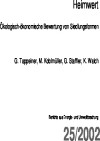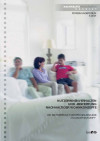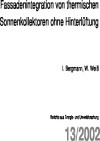Suchergebnisse
Heimwert, ökologisch-ökonomische Bewertung von Siedlungsformen

Schriftenreihe
25/2002
G. Tappeiner
Deutsch, 179 Seiten
Downloads zur Publikation
SpeedReg - Prompt quality assurance of the commissioning process of buildings
The focus of the project is on quality assurance within the commissioning process with the aim to speed up and to improve the operational adjustment of newly constructed or comprehensively renovated buildings. The fragmented know-how which is hardly accessible for the relevant target groups will be consolidated and elaborated in the form of a practice guideline which will be directly applicable in commissioning processes in practice. In this way the project contributes to the development of a common, well-established standard for quality assurance within the commissioning of buildings.
Urban consolidation Lehen - Subproject 2: Development - intelligent E-Monitoring
In the oppositional subproject 2 technical and organisational requirements for the transformation of the innovative Smart Metering-concept will be developed. Through the connection of the application of Smart Metering with an active integration of the inhabitants over mutual communication the concept, which is planned for the key project Urban Consolidation Lehen stands out of other comparable antedated activities.
SchulRen+ Innovative plus-energy refurbishment concepts for school buildings
In a technical feasibility study and based on a real example, the project analysed innovative plus-energy refurbishment concepts for school buildings. The goal was to develop refurbishment concepts with a high replication potential which combine future-oriented energy concepts with feasible technical and architectural solutions.
Symposium: Symposium "Zukunftsweisendes Planen und Bauen"
23. Nov 2006
Wirtschaftskammer Salzburg, Plenarsaal, Julius-Raab-Platz 1
5020 Salzburg, AT
Fachsymposium zum Thema Planen und Bauen unter dem Leitmotiv "Nachhaltigkeit".
Messe: Altbau - ibw, Fachmesse für Bauwerksinstandsetzung
13. Nov 2003 -
15. Nov 2003
Messegelände WelsWels, AT
Diese 2002 erstmals stattfindende Fachmesse bietet altbauspezifische Informationen zu den heurigen Themenschwerpunkten Thermische Sanierung, Denkmalschutz, Mauertrockenlegung, Fassadensanierung und Heiztechnik.
Themenworkshop: Von der Forschung in den Markt (21.11.2012, aws Wien)
Der nächste Themenworkshop widmet sich der Überleitung innovativer Gebäudetechnologien in den Markt. Förder- und Unterstützungsmöglichkeiten werden vorgestellt, Unternehmer präsentieren ihre Erfahrung bei der Markteinführung innovativer Produkte.
Workshop: Haus der Zukunft - Ergebnisse und neue Ansätze
24. Mar 2003 -
25. Mar 2003
Großer Sitzungssaal - Erste Bank, 1. Stock, Schubertring 5, A-1010 WienWien, AT
Veranstaltung zum Start der Projekte der 3. Ausschreibung
Workshop: Lehrgang zum zertifizierten Passivhaus-Planer
27. Oktober - 23. November 2011
BETZ Großschönau
3922 Großschönau, AT
Der Lehrgang setzt sich aus 9 Modulen zusammen, die Schulungsinhalte reichen vom Thema Gebäudehülle, kontrollierter Wohnraumlüftung bis zum Thema Wirtschaftlichkeit.
Ermittlung und Evaluierung der baulichen Mehrkosten von Passivhausprojekten
Die baulichen Mehrkosten bei Passivhäusern entscheiden, ob sich diese am Markt durchsetzen werden. Diese Kosten wurden nun erstmalig bei verschiedenen Haus der Zukunft-Passivhaus-Projekten einheitlich miteinander verglichen. Die Erkenntnisse können eine Einschätzung der Entwicklung geben.
Thermo-Active Building Systems - Development of a Calculation kernel (TBA-CALC )
This project result will provide Austria with a uniform software environment for the simulation of thermo-active building systems in the form of a validated tool.
Comfort and cost optimised air guiding concept for energy efficient housing
Ventilation systems for dwellings can be more efficient in terms of cost and energy, if the air guiding concept with cascade principle (overflow of air from sleeping rooms into living room). In this project, the planning principles had been developed and published in practice guidelines.
Ecological restoration of a listed building with passive house technologies
Ecological exemplary reconstruction of the "Haidenhof"-building, Bad Ischl, Upper Austria. Building refurbishment with respect to monumental protection and newest passive house technologies. Reorganisation of the former residential building to an academy of arts and culture.
Zertifizierter Passiv-Dachgeschossausbau eines typischen Gründerzeithauses
Ausbau des Dachbodens eines typischen Gründerzeithauses zu einem zertifizierten Passiv-Dachgeschoßausbau mit Photovoltaikanlage und haustechnischer Bestandssanierung. Ziel: bauliche Mehrkosten unter 10 %, keine sommerliche Überwärmung und höchste Multiplizierbarkeit für den großen Gründerzeitbestand.
Strat-CON - Strategic Actions for Realising the Vision of ICT in Construction
Refinement and validation of the implementation proposals in order to achieve the realisation of the ROADCON vision and roadmap for ICT in construction by means of stakeholder-workshops, structured interviews and questionnaires.
Nutzerinnenverhalten Und -Bewertung Nachhaltiger Wohnkonzepte

Ein Schwerpunkt der Programmlinie "Haus der Zukunft"
Forschungsforum
4/2001
Herausgeber: BMVIT
Deutsch, 6 Seiten
Downloads zur Publikation
Erprobung von Passivhausstandards am Beispiel des Weizer - Energie - Innovations - Zentrums

Der vorliegenden Bericht über das erste mitteleuropäische Büro - Passivhaus, das Weizer Energie - Innovations - Zentrum (W.E.I.Z), soll die Erfahrungen aus Planung, Errichtung und Betrieb für die Optimierung zukünftiger Projekte sammeln und darstellen werden.
Fassadenintegration von thermischen Sonnenkollektoren ohne Hinterlüftung

Schriftenreihe
13/2002
I. Bergmann
Deutsch, 209 Seiten
Downloads zur Publikation
IEA Vernetzungstreffen 2014 - Elektrizitätsversorgung der Zukunft
15. Oktober 2014
Das ModulPeter Jordan Straße 78, 1190 Wien, AT
Beim diesjährigen Vernetzungstreffen wurde wieder eine Auswahl von laufenden und neuen Aktivitäten innerhalb der IEA-Forschungskooperation vorgestellt. Die Veranstaltung soll den Rahmen zum Austausch zwischen den österreichischen ExpertInnen im Technologieprogramm der IEA bieten.
scaleFLEX - Skalierbare Methode zur Optimierung der Energieflexibilität von Quartieren
Entwicklung einer dezentral organisierten Automatisierungsmethode zur Verbesserung der verbraucherseitigen Flexibilitätsoptionen von Gebäuden und Quartieren. Die dabei verwendeten datengetriebenen Algorithmen versprechen eine hohe Skalierbarkeit und damit geringe Installations- und Betriebskosten. Die entwickelte Methode wird anhand unterschiedlicher Gebäudetypen (High-Tech Bürogebäude, Low-Tech Bürogebäude, Wohngebäude) validiert.
